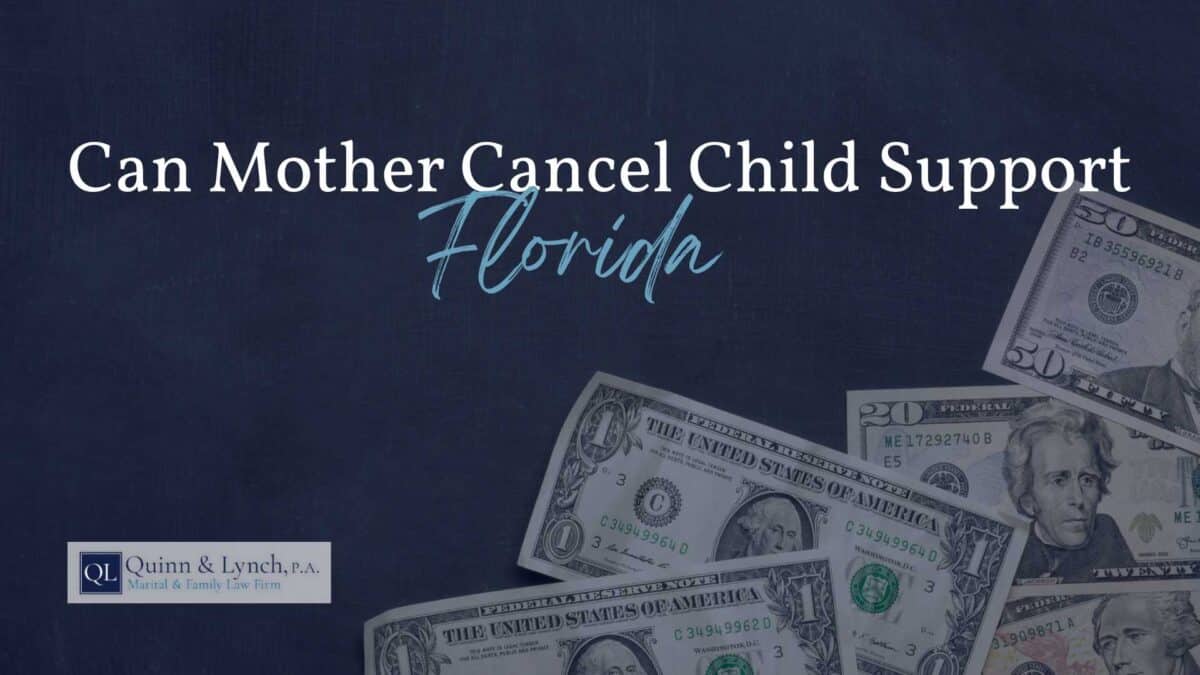If you’re wondering, “Can mother cancel child support in Florida?” the answer depends on several factors related to Florida child support law. A Florida child support order is a legal obligation that the child’s parent, typically the non-custodial parent, must adhere to. Florida courts will order child support in any child support case in which a parent’s gross wages are needed to financially support minor children, ensuring financial stability for the child between homes.
Typically, but not always, non-custodial parents push the other parent to cancel the child support obligation so they may stop child support payments under Florida child support law, offering to bring child support payments to them or essentially making direct payments to the other parent “under the table” outside of Florida courts.
Our Tampa family law attorney covers how to terminate child support orders under Florida child support law, how Florida law has a reasonable expectation that non-custodial parents should pay child support regardless of whether they’re asserting their parental rights, and we’ll answer ‘Does child support end when a parent dies?’
Whether you’re dealing with Florida child support arrears or need help modifying a child support obligation, an experienced family law attorney is here to help. Call (813) 223-7739 to schedule a consultation with one of our Tampa child support attorneys.
Florida Child Support Laws
Florida child support laws are designed to ensure a minor child or minor children receive the financial support they need from both parents. The Florida court system follows strict guidelines when calculating child support orders. How child support is determined in Florida largely depends on the following:
Determining Amounts: Florida utilizes the “Income Shares Model,” which estimates the amount parents would jointly spend on their child if living together. Each parent’s gross wages and if there are multiple children included are primary factors in this calculation. Courts also consider other forms of compensation, such as property ownership, unemployment assistance, retirement and pension, Social Security, alimony, etc.
In situations in which non-custodial parents are unemployed or underemployed, the judge may issue a court order for imputed income in Florida. Here, the court calculates an appropriate salary to determine the total support owed.
Time-Sharing and Overnights: The number of overnights the child spends with the custodial parent and the other parent influences the support amount.
Health Insurance: Florida law mandates that the child support order addresses the provision of health insurance for the minor child or minor children if it’s reasonably available.
Deviations from Guidelines: If justified, courts may deviate from Florida child support law or guidelines by more than 5%. As the minor child ages, he or she may need more or less financial support.
Duration of Support: The child support obligation typically continues until the child turns 18. However, a Florida child support order may extend past this if the child hasn’t graduated high school, with a reasonable expectation that they will graduate high school before 19, or if the child has a mental or physical incapacity requiring them to receive child support.
These guidelines ensure each child’s parent provides adequate financial support.

How are Florida Child Support Orders Calculated
Florida child support orders are calculated using specific guidelines that consider each parent’s gross wages, the number of minor children, and time-sharing arrangements. Florida’s child support laws also consider health insurance, childcare costs, and other expenses for the child support obligation.
Each parent’s financial support obligation is determined based on their proportional share. For example, if you and the other parent have a combined income of $4,000 a month and earn $1,000 a week, our child support laws consider your share of the income when calculating child support in Florida.
Many parents ask, “If I make $1000 a week in Florida, how much child support do I pay?” In general, you’d pay $800/month for one minor child. The child support obligation typically increases by $200 for each child in cases where there are multiple children.
For more information on Florida child support laws, contact our law office.
How to Stop Child Support in Florida
Sometimes, parents wonder if they can bring child support to an end. According to Florida child support law, child support ends when a child turns 18 or the child graduates high school. For situations in which parents need to modify or terminate child support payments, they’ll file a petition (typically with the same court that issued the first child support order) and request to modify or terminate the original child support order.
We’ll explain when child support arrearage, income deduction orders, and license suspensions apply.

How to Terminate Child Support Arrears in Florida
Child support arrears in Florida refer to the outstanding amount needed to bring child support payments up to the court-ordered child support obligation. Florida judges strive to ensure each minor child gets the financial support to which they’re entitled, so terminating child support arrears isn’t easy.
Petitioning the Court: To terminate the child support arrears, you must file a motion with the same court that issued the original support order. This should provide compelling reasons for the court to consider reducing or eliminating the child support arrears.
Demonstrating Good Faith Efforts: Courts are more inclined to consider your request to end child support arrears if you can demonstrate consistent efforts to pay the support owed.
Mutual Agreement Between Parties: If the other parent agrees to waive the arrears, this agreement can be presented. The court must approve any such agreement.
Legal Representation: Navigating the legal system can be challenging, and having an experienced attorney can be beneficial.
Alternative Solutions: In some cases, the court may offer alternative solutions, such as a payment plan for the arrears or community service in lieu of payment.
How to Stop Child Support Garnishment in Florida
If a parent accumulates child support arrearage, they have an Income Withholding Order (IWO), previously called an Income Deduction Order, that typically accompanies child support orders until the child support obligation is paid in full.
To stop garnishment, the non-custodial parent must either pay off the child support arrears or request a court modification of the original child support order. The paying parent may need to provide evidence of income reduction, job loss, physical incapacity, or other hardships to convince the court to adjust the Income Witholding or Income Deduction Order.
How to Stop Child Support From Suspending Your License in Florida
Falling behind on child support payments can result in the suspension of your driver’s license in Florida. It’s important to stay current with your child support payments or arrange a payment plan with the court to avoid a suspended license for nonpayment of child support in Florida.
We’re also asked about whether you can get a passport if you owe child support in Florida.
The court does order child support in Florida to ensure financial stability for the child. An overdue child support obligation can show that the parent isn’t being financially responsible, so unpaid child support in Florida can prevent you from obtaining or renewing a passport.

If You Sign Over Parental Rights, Do You Still Have to Pay Child Support
We’re often asked, “If you sign over your rights, do you still have to pay child support in Florida?”
For child support in Florida, signing over your parental rights does not release you from the child support obligation. Child support payments are still required, even after parental rights are relinquished, typically unless the child is adopted or a court order explicitly terminates the child support order. Regardless of whether parental rights are in place, courts will impose the obligation of child support payment until there is another party who is financially responsible and wishes to adopt.
An experienced child support attorney can help parents understand the consequences of signing over parental rights in hopes of ending child support in Florida. To learn more about how signing over parental rights could affect your support order and whether you can terminate child support in your circumstances, contact our Tampa child support modification attorney team.
When Do You Stop Paying Child Support in Florida?
Parents often wonder, “When does child support end in Florida?” Typically, child support ends when a child turns 18 or graduates. Certain circumstances can affect when child support ends in Florida.
In cases where an 18-year-old has not graduated high school but is expected to graduate high school before turning 19, the court may continue the child support obligation until the child graduates.
For cases involving special needs children or children who are unable to become independent due to a physical or mental disability, the support obligation can be extended indefinitely.
The specific terms of when child support ends will be outlined in the original court order, and the court must approve any changes to the child support order.
How Do I Stop Child Support When My Child Turns 18 in Florida?
To stop child support when your child turns 18 in Florida, you will need to ensure that your child support order does not specify any extended obligations, such as continued support payments while the child completes high school.
If the child support order includes provisions for support payments past 18, you may need to file a motion with the court to officially terminate child support. While Florida law does not require child support for college students in Florida, if your support order includes any college-related expenses, these payments must be addressed through the court system.
Does Child Support End When a Parent Dies in Florida?
Child support in Florida does not automatically end when a parent dies. While the deceased will not continue paying child support, the deceased parent’s estate is typically responsible for continuing support payments. Custodial parents may file a claim against the estate to ensure direct payment to them or through the Florida State Disbursement Unit.
Reasons to Modify Child Support Payments in Florida
There are several valid reasons to modify child support orders in Florida. Common reasons to modify the support obligation are substantial changes in income or changes in the child’s needs. Additionally, in child custody cases where the minor child or children starts spending more time with the other parent, modification can help reflect the new child custody arrangement. Other reasons to modify child support orders include the birth of additional children or a parent becoming disabled.
Only modifications through the court system ensure changes to the Florida child support order are legally binding.
Consequences of Ignoring a Child Support Order
If a parent stops paying child support, the state of Florida takes various enforcement actions to ensure the child receives financial support. Courts can issue a warrant for the arrest of the non-paying parent as a child support enforcement action.
So, how far behind in child support before a warrant is issued in Florida?
While the answer depends on the child support case, typically, harsher child support enforcement actions are issued when support payments are significantly overdue, or the parent consistently fails to follow the child support order.
Additionally, a Florida judge may seize tax refunds, freeze bank accounts, or take other child support enforcement measures.
If you are struggling to keep up with your child support payments or need help addressing child support enforcement actions, it’s important to consult a Tampa child support enforcement lawyer.
Direct Payment to the State of Florida
Many people make direct payments to the state, or their employers will make Florida child support payments on their behalf through an Income Withholding Order (IWO). Payments are sent to the Florida State Disbursement Unit run by the Florida Department of Revenue Child Support Enforcement. When employers deduct due to income deduction orders, the money goes through the Florida State Disbursement Unit.
The Income Withholding Order typically accompanies child support orders in Florida. These income deduction orders should contain ending child support dates. If there are multiple children included, the Income Withholding Order should include the modified child support obligation as each child ages out.

How Our Tampa Child Support Attorneys Can Help
Our Tampa child support lawyers understand the challenges that come with child support issues. Whether you need help modifying an existing child support order, enforcing unpaid child support, or terminating payments, our experienced child support attorneys can help.
Call (813) 223-7739 to schedule a consultation with an experienced family law attorney.
















